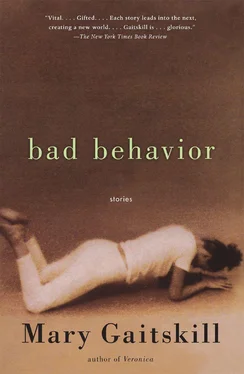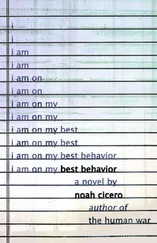She had dinner that night with her old friend Barbara. They went to a restaurant on Bleecker Street that served neat little dinners to predictably soothing music. Barbara was a jeweler who had never quite been able to become a big name in the industry, but whose work was a persistent presence in fashion magazines and department stores. She had recently separated from her husband of twelve years, a sculptor whom Susan had known. Barbara didn’t seem so much upset by the separation as appalled.
“I can’t say that suddenly we didn’t know each other, or anything like that, because I actually know John very well. It isn’t even that we don’t love each other anymore, because I do love John, even if it’s more of a sisterly love at this point. People say that it gets that way after you’ve been married awhile.” She cut her salmon steak into pieces with polite, relaxed moves, as though pausing in a discussion of art or film.
“Well, what is it, do you think?” asked Susan.
Barbara sat back. “I’m not sure how to describe it. It was like everything that supported the relationship was coming from the outside. Judging by all the signs, we were a perfectly successful couple and John was an ideal husband for me — rich, blond, tall, sensitive, ad nauseam. But even worse, it seemed as if our most intimate conversations were based on what we were supposed to be saying, and what we were supposed to be. Nothing seemed to come directly from us. Do you know what I mean? I sound like a hippie, I know.”
“No, I know what you mean.”
“I don’t know. I didn’t see it that way at the time. He was just driving me crazy and I guess I was driving him crazy too.”
“I don’t know anymore how much a relationship can be based on what comes from the inside,” said Susan. “With Steve and me, it’s all based on us, and it’s very genuine and very sweet but sometimes it seems as if we’re involved in a fantasy that has nothing to do with the real world. Maybe there’s nothing wrong with that, I don’t know, but it can begin to feel solipsistic.” She remembered what her father had said to her during an argument when she was fifteen years old: “You want to suck people dry, you expect them to pour out their guts to you and you to them over and over and over until you know everything, and it just doesn’t work that way. Relationships are built from ‘Hi, how are you doing?’ and ‘I’m fine.’” He had said this last word like a stake was being driven through his heart.
“Do you remember Leisha?”
“I sure do. The nutty one with the musician boyfriend. Why?”
“I thought I saw her on the street today. There was this bag lady who looked just like her.”
“Oh, my God.”
“I didn’t realize that it wasn’t her until I was an inch from her face.”
“What did you do?”
“Gave her five dollars.”
She lay on Bobby’s futon and thought of Steve. He was a quiet man whom she considered brilliant. He worked in the public relations department of a magazine neither one respected. They saw each other almost every night, they had keys to each other’s apartment. They had private jokes and several cute nicknames apiece. Sometimes it seemed as if they spoke a language foreign to other people, that there was something closeted and defeated in their closeness. But they made each other happy. There was, in magazine-speak, a “real connection.” She opened her eyes. “Connection” was a vague word when applied to humans. What did it mean? She remembered a man she’d had a short affair with before she’d met Steve. He was a sweet, practical person who never read books, rarely went out, and didn’t seem to care strongly about anything except a few close friends and a martial art he practiced with fanatic zeal. They had nothing in common. In most ways he bored her. Yet when she touched him she felt a sensitivity in his body, a sense of receptivity that she rarely encountered in men. When he held her against his chest, she felt secure and protected in a way that had nothing to do with his muscular body. She felt that they were nourishing each other in some important, invisible way. But they could barely hold a conversation.
At times she had thought that this was the only kind of connection you could have with people — intense, inexplicable and ultimately incomplete. During the months that her friendship with Leisha was beginning to wane, she would think, Well, I can’t talk to her and I don’t respect her, but she has a beauty that can perhaps only be appreciated on a nonintellectual level. Like a sudden flame of piercing movement in an unexceptional dancer, or the grace and spirit of an animal.
She remembered them walking down St. Marks together doing an acting-class exercise. One person would say something and the other person would repeat it, with slight changes in words or expression. Susan thought it was pointless, but Leisha loved the exercise.
“I love to walk down the street and look at people,” began Leisha.
“You love to walk down the street looking at people.”
“People look at me when I walk down the street.”
“You like it when people look at you.”
“You like it when people look at you.”
“I’m scared when people look at me.”
“I’m scared when people look at me.”
“But you like it.”
“Do you like it?”
“It makes me nervous and I pull my earrings.”
“You pull your earrings all the time.”
“I hate to pull my earrings.”
“I want to pet your earrings.”
“You want to pet my earrings.”
It was like nursery rhymes; they were two cute girls walking down the street talking harmless nonsense, while all around them the world was in full operation. Desperate vendors displayed miserable items arranged on dirty blankets — T-shirts, ratty sweaters and vinyl belts, wrinkled old magazines, faded books and records. Garbage flapped in the streets and humans walked up and down the sidewalks, on their way to perform hundreds of actions in a remarkably orderly fashion. The sun was evenly warm and pleasant and it seemed as though this was all that anyone could expect out of life. Susan felt an ache of futile tenderness for Leisha and she impulsively reached out and stroked her four serial earrings the way she would pet a cat.
It was sometime during her second year in New York that their conversations began to seem like frantic attempts to wring each other for support that neither could give. Leisha became involved with an abusive rock musician. She called Susan, it seemed, only when she was hysterical in a phone booth after a fight with him. When he left her for a singer, Leisha went to Bellevue, was discharged, slit her wrists, went home to Michigan and returned in a state of quasi-hysteria that remained constant for the rest of the time Susan knew her. She immediately moved back in with the musician, who had been dumped by the singer. She was dropped by most of her Michigan friends, who said that she was too self-indulgent and theatrical to cope with. Susan didn’t know if what they said was true or not, but it seemed unkind. She wanted to remain loyal to Leisha, but she was floundering so thoroughly herself that when they talked they seemed like drowning people clinging to each other for life.
The first time the musician walked out, Leisha called her at five in the morning, sobbing and pleading with her to come over. Susan got out of bed and took a cab down to Eighth Street, where ghostly men and women were tipping over garbage cans to better examine the contents. She sat in Leisha’s grandly rumpled, granule-ridden bed, holding her tight in her arms, as though the pressure of her grip should equal the intensity of Leisha’s trembling. “I feel so empty, Susan, I feel so rotten and empty inside.” Susan kissed her forehead and stroked her hair and held her until her arms were sore, but she did not know what to say. Eventually, Leisha’s trembling subsided and she slept, and Susan sat completely still, watching some fat, hideous pigeons stump around on a neighbor’s filthy window ledge while Leisha’s skin became stuck to hers and her limbs went gradually numb. Why did Leisha feel empty? What did empty mean? What should exist in Leisha that didn’t? Was it a quality that other people had? She tried to imagine what Leisha looked like inside and pictured a set of dull-colored wires, some dead, others short-circuited and flickering in the dark, discharging a profusion of heat and bright color that sparked wildly, blew fuses and went dead.
Читать дальше












